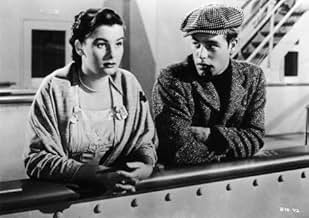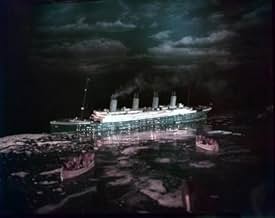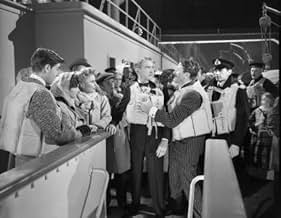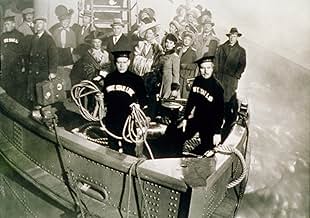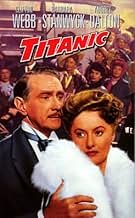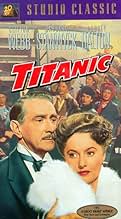Um casal infeliz luta para lidar com seus problemas a bordo do luxuoso e malfadado Titanic.Um casal infeliz luta para lidar com seus problemas a bordo do luxuoso e malfadado Titanic.Um casal infeliz luta para lidar com seus problemas a bordo do luxuoso e malfadado Titanic.
- Direção
- Roteiristas
- Artistas
- Ganhou 1 Oscar
- 1 vitória e 3 indicações no total
- Seaman
- (não creditado)
- College Girl
- (não creditado)
- Jean Pablo Uzcadum
- (não creditado)
- Passenger
- (não creditado)
- First Officer Murdock
- (não creditado)
- Passenger
- (não creditado)
- Dock Official
- (não creditado)
Avaliações em destaque
Nonetheless, Ray Kellogg's special effects are outstanding, especially the liner as it lists headfirst into the water that became a spectacular logo for the movie's ad campaign. Note, however, the general absence of noisy panic surrounding the evacuation, the opposite of what you would expect given the life and death circumstance. Generally, both passengers and crew react efficiently as if executing a fire drill. I suspect anything more realistic would have risked unsettling 1950's audiences and dampening box-office appeal, but whatever, the general absence is noticeable. Also, I'm not clear on what happened to the women and children in steerage. These are the poor folk presumably responding to America's "give us your huddled masses yearning to be free". Maybe I missed something, but the class segregation aboard the liner is made unmistakably clear and we do know the ladies and children of wealth made the cut. But what about those "huddled masses" since the movie is based on fact? Still and all, not to worry since they're all going to heaven anyway as the final choral overlay assures us.
Speaking of class struggle, too bad the screenplay doesn't exploit the lively potential of a Clifton Webb-Thelma Ritter face-off. They're two extreme ends of the refinement spectrum — the earthy commoner and the waspish aristocrat. Yet no one was better at delivering sarcastic barbs than these two. Squaring them off against one another would have produced great verbal fireworks and social contrast. All in all, the movie is entertaining with some good moments, but fails to hit the dramatic high points inherent in the real life tragedy. Ultimately, the screenplay reflects the extreme cautiousness of its time period.
In this version, Stanwyck is actually leaving her husband (Webb), unbeknownst to him, but when he realizes what's happening, he bribes the father in a lower class for his ticket. Webb is a social climbing, superficial man, and his American wife wants more for her kids than snobbery, arranged marriages, and a series of hotels instead of a home, so she is going back to her family with the children. What happens to Webb and Stanwyck's relationship during the voyage is powerful, touching - and, alas, too late.
While on board, a young, gorgeous Robert Wagner plays a college student suitor to the daughter, played by Audrey Dalton. Webb's last scene with Stanwyck will leave you in tears, and if it doesn't, there's also the poignant scene on deck with his son, Norman, which is beautiful.
I don't pretend to be an expert on the Titanic - however, I know a little more than a friend at work who, announcing she was seeing the Cameron version when it first came out, said, "Don't tell me how it ends." I realize that the Fox script drew a good deal of information from the navigation reports of the ship; however, I saw a documentary which showed footage of this film while it demonstrated that in this telling, the underwater scene shows the iceberg hitting on the wrong side.
I have also seen "A Night to Remember," which I also remember as being a very emotional experience. Perhaps it's the story that tugs at our hearts, or the site of that huge vessel sliding beneath the surface. Whatever it is, this is a truly engrossing and heartwrenching film.
Many decades before James Cameron delivered Titanic as a disaster movie with a dramatic relationship at its core, someone else had already done it with this 1953 disaster melodrama. The main difference in the narrative is perhaps a note on the difference with our time because the story is not about romantically intertwined young people but rather an older married couple and their romance. Aside from this difference the approach is similar because the majority of the film is a melodrama driven by the characters, which then is fitted into the bigger drama of the ship sinking, taking many with it. Unlike the effects-heavy modern version, this film puts the focus on the family drama happening.
This works well in making for an engaging film as we see the very English Richard clashing (in an English way) with the more modern Julia in their relationship. Of course it all comes good in the end (well, in a way) but up till then this centre-piece held my attention well. The emotion during the actual sinking of the ship is well received as well, it is restrained and very much the stiff-upper-lip type of thing of the period. Compared to the manipulative use of music and sweeping expressions of emotions in the remake, I must admit I found the changes in the characters played out with restrained emotions of the disaster. The cast work well with this. Webb is strong in his character, retaining what makes the man while also softening towards the end. Stanwyck does likewise, convincing in her early character but yet able to find the love inside her character from the past. The rest of the cast are solid enough but do not really have the same material as the two leads; Dalton, Aherne, Wagner, Basehart and others are all good enough for what is asked of them and, as normal, Ritter is entertaining in her usual character.
Overall then, an engaging melodrama that maintains a very British sense of emotion but yet is still quite moving. Those who have not yet seen the remake for what it is should perhaps take a pass at this and see if they prefer this version for being shorter and more restrained.
Você sabia?
- CuriosidadesDuring the boarding of the lifeboats, Norman Sturges (Harper Carter) changes seats with a woman who arrives at the last moment when the boat was completely full. This was inspired by the action of a Mexican passenger in first class named Manuel Uruchurtu, who did the same thing to a woman from second class who was refused a seat on the lifeboat. After he gave up his seat to her, he asked her to travel to Mexico, if she survived, and tell his wife what happened. His body was never found.
- Erros de gravaçãoTrying to buy a ticket at the last minute, Richard Sturges (Clifton Webb) is told that the voyage has been sold out since March. In fact, it wasn't even close to sold out.
- Citações
Richard Sturges: [after Richard and Julia have been quarreling over who will have custody of their son] My dear Julia, I've been around enough bridge tables to recognize someone who's holding a high trump - play it now if you will.
Julia Sturges: We'll discuss it later.
Richard Sturges: Now!
Julia Sturges: All right, Richard. One question first?
Richard Sturges: If it's about Norman, you know the answer. No court in the world, no power in the heavens can force me to give up my son.
Julia Sturges: He is not your son.
- ConexõesEdited into A Inconquistável Molly (1964)
- Trilhas sonorasThe British Grenadiers
(uncredited)
Traditional Music
Arranged by Herbert W. Spencer
Played by the band on the Titanic
Principais escolhas
Detalhes
- Data de lançamento
- País de origem
- Idiomas
- Também conhecido como
- Y el mar los devoró
- Locações de filme
- Empresa de produção
- Consulte mais créditos da empresa na IMDbPro
Bilheteria
- Orçamento
- US$ 1.805.000 (estimativa)
- Tempo de duração
- 1 h 38 min(98 min)
- Cor
- Proporção
- 1.37 : 1


